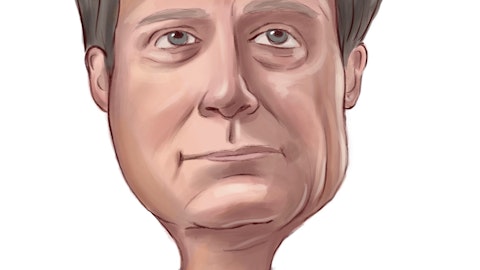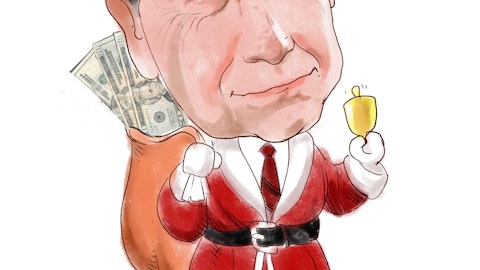Peter Galbo: Okay, no that’s helpful. And then maybe just to follow-up on Adam’s question on CapEx. Obviously, kind of, from a position of strength, you guys are accelerating some of the spend. Bernadette, it didn’t sound like you were, kind of, pulling forward any spend from next year, but maybe just wanted to clarify that? And then just in a broader context on, kind of, capital allocation with the CapEx spend being as high as it is and maybe you’re going to move past through a lot of that. The debt’s turned out pretty far at this point. You started to buy back a little bit of stock in the quarter. The dividend yield is pretty low relative to peers, just maybe you can kind of comment on how you’re seeing the setup for some of the other pillars within capital allocation? Thanks very much.
Bernadette Madarieta: Yes. So if I take the latter question first, As Tom mentioned, we’re still really confident in the strength of this category and we’re going to continue to invest for the long-term. As it relates to our cash position and our overall low debt to equity ratio, we want to maintain flexibility for the long-term should certain things happen or open up for us from an M&A or other perspective. And so we feel good about where we’re at. So our capital allocation hasn’t changed, and we’re going to continue to take into consideration share buybacks as we have in the past to offset management dilution. But as we’ve also shown, we will opportunistically buyback when it makes sense. And then just to confirm your first question on the capital spending, we haven’t necessarily pulled much forward in terms of total capital spending. We’ve got a lot of large projects happening over the next 18 to 24 months. And some of that was just on some long lead time equipment.
Peter Galbo: Got it. Thanks very much guys.
Operator: Rob Dickerson from Jefferies. Your line is open.
Rob Dickerson: Great. Thanks so much. Maybe just my first question, more mechanical . It looks like the interest expense expectation for the year hasn’t changed, but clearly taking on the term loan and then maybe some assumed pre-existing debt I would think from Meijer. Maybe just, kind of, quickly explain, so maybe I just missed it in the prepared remarks, kind of how that interest expense doesn’t change with the assumption of debt?
Bernadette Madarieta: Yes. No, that’s a great question. What we’re finding is that we’re having more capitalized interest related to some of these heavy capital projects, which is putting more of that — which is offsetting some of that interest expense overall. So that’s all that you’re seeing there.
Rob Dickerson: Got it. So that — but that would probably more like a Q4 event like we would still assume that even though you’re not guiding that there would be incremental debt and interest given the deal. Just thinking about the mechanics of the actual acquisition?
Bernadette Madarieta: Yes, you’re exactly right. You’re thinking about it right.
Rob Dickerson: Okay, super. And then maybe just Tom and Bern, just kind of we’re talking about a lot of commentary around that $100 million on the Meijer — sorry, yes, on the Meijer JV and kind of what the potential run rate could be? Maybe just another kind of way to ask it is just that seed number we’ve been — we’ve all been talking about vis-Ã -vis, kind of, pre-pandemic? But then also there are all these synergies or some synergies that should come through. So I’m just curious like over the past few months, you’ve actually closed the transaction, do you feel like you have better line of sight on, kind of, synergy potential without having to quantify them over the next two to three years?





